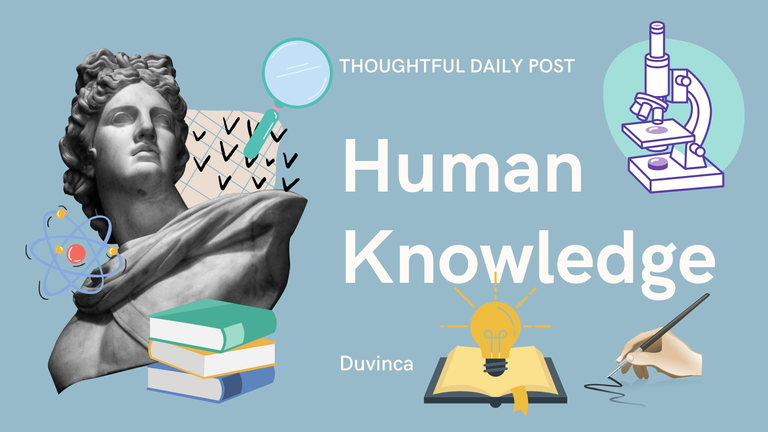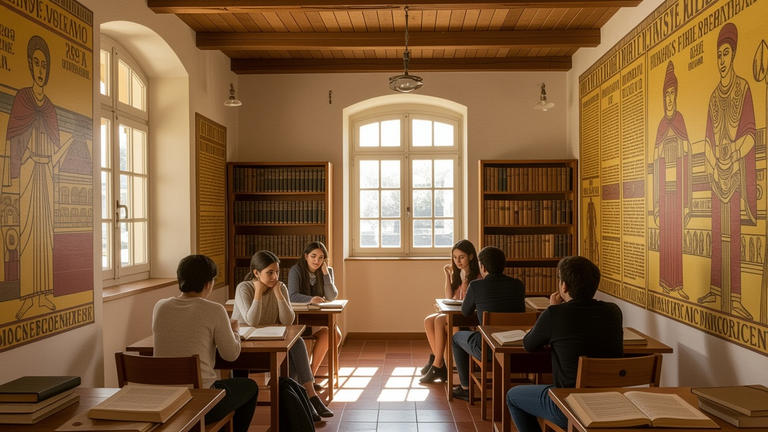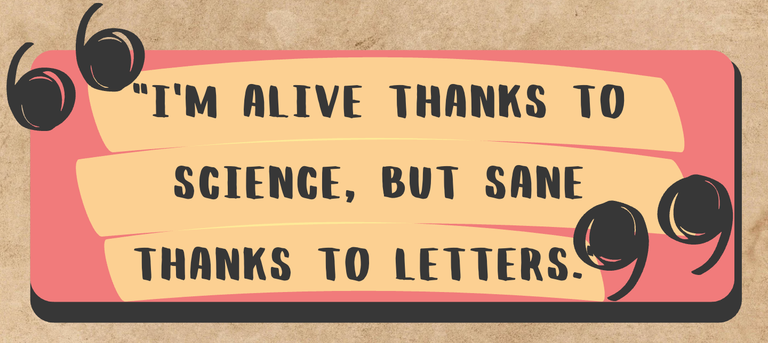Human Knowledge
Hello people!
Precisely now, with the rise of so-called "Artificial Intelligence", we should also reflect on the value and role of human intelligence, and whether everything can be focused on technology and science, while human knowledge for humans seems to be increasingly less important, or not? Having culture and wisdom doesn't only refer to accumulating specific knowledge to obtain a desired job; there are many subjects that we are leaving aside, there, relegated to a dark corner of an old library...
Recently, certain "humanities" subjects, as they say, are being devalued or especially undervalued in educational programs. Most prefer to focus simply on technical knowledge. Apparently, as many believe, these are the only ones needed to achieve the professional goals demanded by the current hyper-technological market, regardless of the actual intellectual training of the human being.

For this reason, because of the undervaluation that all humanistic subjects are suffering, many express their discontent and demand what truly makes us who we are: yes, the humanities. Defenders of numbers and science will present arguments related to the future and reason... but aren't the humanities the true source of reason? Isn't all this knowledge what nourishes us with ideas and allows us to be critical, thinking, and reflective beings?
Subjects like philosophy, history, art, literature and language... in one way or another are part of our lives, of us, and of our days. Our society, which now values only engineers, computer scientists, and programmers, is shaped by language, which nourishes our modern communications, and we must say that our languages are far from dead. How much Latin do doctors or biologists need to know, to understand nomenclature, for example? We'd be surprised to know how many Latin expressions we use routinely without realizing it, and many of those who are good at languages would appreciate having studied it a little more, because knowing or not knowing is something that shows.

Also, "I think (therefore I am)" means we should know who Rousseau was, who clearly understood that man is good by nature, but that from the moment someone put up the first fence and said, "This land is mine," that's when property and our society began. Isn't that the beginning and the best definition of our current capitalism? I don't know if we should ignore everything Nietzsche thought about nihilism or forget about that world of ideas that Plato showed us with shadows in that cave in which we find ourselves. And well, we've seen that some people try only to appear cultured and educated while getting confused when quoting or mentioning philosophers, like Kant... although surely all of us, at some point in a carefree moment of enjoyment and glory, have said, "Carpe Diem!" right?
Another topic is history, ugh, for many, that insufferable and boring subject... the fact is that, curiously, many talk about democracy or a republic, while we read in the science section of the newspapers about new discoveries, in Pompeii, or in a tomb of Tutankhamun. But do we know why that Egyptian king is so notorious? Or does anyone remember how they built impressive cathedrals in the Middle Ages? Or how many universities Spain founded in the New World? How can we ignore everything that previous peoples like the Roman Empire did and what they gave us? Could we live today without Roman laws or without the number 0 that the Arabs brought from India, like in that computerized language of zeros and ones?
And history is also closely linked to art. I find it sad to go on a wild sightseeing spree in any city in our country, Europe, or the world, taking selfies in front of everything and then posting it three seconds later on all our social media accounts without knowing what it is, without listening to the guide or having read anything, or worse... without recognizing or knowing anything.
All this knowledge doesn't end there; it also shapes our way of being and thinking, and how we enjoy things, how we know ourselves, and of course, how we interact in our world. It's actually "education," because it's not just about learning concepts but about learning a way of behaving "humanly." Because we are human, and we have to admit that what words or literature, notes or music convey to us is difficult to achieve with a couple of formulas and computer programs. While it's true that calculations aren't exciting, they seem to help us find better jobs more in these future times.
So, for those who continue to seek a simple utilitarian or practical perspective on knowledge, I mean, well, what good will this do me? In principle, it provides us with a general culture that, nowadays, will undoubtedly make a difference… for example, if we have meetings with businesspeople, clients, etc., at some point during a mandatory dinner, we should also have a topic of conversation, or at work, we should know how to speak well, how to argue, write correctly and with simple but appropriate syntax… Perhaps you won't be hired specifically to know who wrote "Don Quixote," "The Divine Comedy," or "Hamlet," but we will show ourselves as curious humans with an inner world, as people capable of learning, with joy and a desire to continue doing so.
And regardless of everything, the humanistic knowledge, now undervalued (because there are those who still prefer people without a critical spirit, no one who questions) will continue to make us freer. Because in the end, there shouldn't be a conflict between science and literature, but rather a complementarity. We need to know a little bit of everything, like a Renaissance man, and feel part of an intellectual world that makes the natural world more real, more human, and more ours. And so I read on X/Twitter:
Thanks for reading! Have a cool and nice day.

The text is totally mine by ©Duvinca - The banners and quote are made by me using Canva.com and the second image with the PeakD IA tool. -


Io sono prima di tutto una classicista, pur avendo poi acquisito una laurea che oggi fa molto figo dire laurea in discipline STEM come se quelli che si laureano in discipline STEM avessero il quoziente intellettivo più alto di altri.
La verità è che noi misuriamo tutto a suon di logica. Il QI è misurato solo in base a test logico/matematici. Quindi se sai far bene di conto, capisci e intuisci velocemente relazioni e sequenze alfa numeriche o di immagini, hai un QI alto. Altrimenti non vali una cippa.
E quindi poi nel mondo del lavoro vanno avanti tutta una serie di personaggi a dir poco stravaganti che hanno sì un QI altissimo, ma doti culturali nulle e soprattutto un quoziente emotivo e sociale pari allo zero.
E quindi ti ritrovi a far di conto con persone con le quali non riesci proprio ad interagire, o a parlare di nulla.
E intanto perdiamo conoscenze, capacità e umanità.
Gran bel post, con tutti i miei idoli, Kant incluso.
!LOLZ
Grazie! È proprio così, sembra che quelli preferiscono studiare filosofia, lingue, storia, ecc. Non siano così intelligenti e quindi non servono per questo mondo lavorativo ultra calcolato, ma in realtà non è così perché hanno delle abilità di relazionare tutto, una mente più complessa e non solo verso numeri ma osservano in modo poliedrico tutta la realtà inclusa quella dei QI alto che sanno solo le loro cose invece... e a che servono tutte queste conoscenze se non riescono pii a riflettere? Poi la tecnologia si usa in tutti i campi, come fa ora un archeologo per fare gli analisi o gli insegnanti che creano più attività per ragazzi con nuovi mezzi perfino ora l'AI...
!LOLZ
lolztoken.com
Sofishticated.
Credit: reddit
@sissim72, I sent you an $LOLZ on behalf of duvinca
(3/10)
Delegate Hive Tokens to Farm $LOLZ and earn 110% Rewards. Learn more.
Il mondo del lavoro è cambiato, adesso si cerca gente che sappia fare quello che serve e anche subito, nessuno è disposto a fare da mecenate ad artisti per esempio, di conseguenza un artista per vivere è costretto ad abbandonare quello che ama e andare sul concreto... Idem le ricerche sulla storia, la filosofia, perché alla fine della fiera bisogna mangiare... Resto sempre dell'idea che andrebbero seguite le inclinazioni personali nella scuola, se amo la filosofia è giusto privilegiarla nei miei studi, se amo la storia o l'elettronica o la programmazione idem
È proprio così, adesso purtroppo bisogna interessarsi soltanto per le cose pratiche ma lasciamo fuori le nostre inclinazioni e doni perchè questa società non valorizza queste altre conoscenze. Ma si potrebbe trovare un ponto nel mezzo, cioè conosco persone interessate alla storia che usano stampanti 3D per fare modelli di oggetti trovati negli scavi... quindi in quei casi tutti i due mondo possono combaciare anche. Grazie per commentare!!
!PIZZA
Questo è vero, un bell'esempio
!PIZZA anche a te
$PIZZA slices delivered:
@davideownzall(4/15) tipped @duvinca
duvinca tipped davideownzall
Come get MOONed!
!HUG
!LADY
!LUV
View or trade
LOHtokens.@ladyaryastark, you successfully shared 0.1000 LOH with @duvinca and you earned 0.1000 LOH as tips. (1/4 calls)
Use !LADY command to share LOH! More details available in this post.
Ottimo post con ottime riflessioni. L’AI farà sempre più parte del quotidiano, alemeno secondo me, ed oggi non la vedo come il male assoluto. L’AI è uno strumento che se usato bene, riesce ad amplificare le nostre capacità. Come hai scritto, abbiamo bisogno anche di comprensione e di non perdere la nostra umanità. Ora lascio qui una considerazione che puó far riflettere. L’AI mi ha rispiegato alcuni argomenti di elettrotecnica che mi interessavano per portare avanti un progetto che sto facendo da hobbista… in quel caso mi ha fatto comprendere non solo quelle cose che avevo chiesto, ma come a scuola certe cose mi erano state spiegate veramente male e con poca umanità. !LUV
Grande esempio! Infatti è così perchè non approfittare tutto ciò che l'AI può darci? Possiamo usarla per diventare più saggi, per sapere di più, per capire meglio le cose con una spiegazione più ragionevole forse, per queste cose credo che sia un buon strumento perchè come dici tu alcune persone non fanno bene ciò che li spetta... e poi per altre cose si, ci siamo noi 😉
!HUG